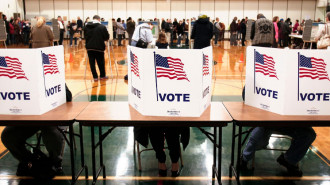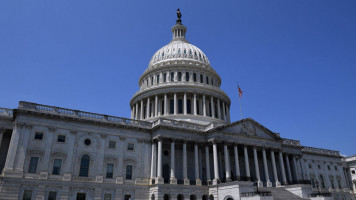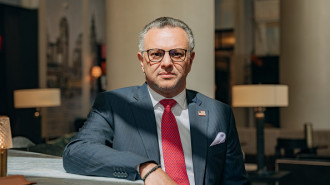Iran's Zarif back at nuclear talks on deadline day
Iran's Zarif back at nuclear talks on deadline day
Iran's foreign minister returned to the nuclear talks in Vienna where negotiators are struggling to overcome still significant differences and preparing to work through Tuesday's self-imposed deadline for a deal.
3 min read
Zarif rejoined the talks after a day of consultations in Tehran [AFP]
Iranian Foreign Minister Mohammad Javad Zarif arrived back in Vienna on Tuesday for nuclear talks with world powers after holding a day of consultations in Tehran, Iranian officials said.
Iranian Foreign Minister Mohammad Javad Zarif rejoined the talks after a day of consultations in Tehran and was meeting first with US Secretary of State John Kerry.
Zarif was accompanied by Iran's nuclear chief Ali Akbar Salehi, as well as President Hassan Rouhani's brother and close confidante Hossein Fereydoun.
Iran's official news agency said Salehi's participation indicated Iran's serious desire to accelerate the talks and achieve a comprehensive deal.
Russian Foreign Minister Sergey Lavrov was also expected to join the discussions.
Zarif told reporters on arriving in Vienna that Iran would only accept an agreement that is "fair, balanced and also based on national pride and the rights of the Iranian people."
"I feel the negotiations have reached a very sensitive stage, and at this stage, with political will, determination and lots of work, progress is possible," he added.
On Monday, US officials suggested that significant backtracking by Tehran's negotiators may need several more days of discussions to resolve.
Monday had originally been envisioned as the penultimate day of a 20-month process to assure the world Iran cannot produce nuclear weapons and provide the Iranian people a path of out of years of international isolation.
But officials said over the weekend they were nowhere near a final accord and Zarif flew back to his capital for further consultations.
Several signs pointed toward Iranian intransigence and perhaps even backsliding on a framework it reached with world powers three months ago.
At a briefing for some three-dozen, mainly American, reporters, a senior US official repeated several times that the final package must be based on the April parameters - "period."
The official declined to elaborate because of the sensitivity of the diplomacy; reporters were updated on the condition that no individuals be quoted by name.
At the United Nations, French Foreign Minister Laurent Fabius told reporters that no new target date has been set for concluding the nuclear talks, which would set a decade of restrictions on Iran's enrichment of uranium and other activity in exchange for tens of billions of dollars in relief from international economic sanctions.
Fabius, who was in Vienna over the weekend, repeated his country's red lines for an agreement: stricter limits on Iranian research and development, capacity for UN nuclear monitors to verify the deal and the ability of world powers to snap sanctions back into place quickly if Iran cheats.
In addition to France, Russia and the United States, other negotiating countries are Britain, China and Germany.
France's conditions are essentially the same as America's, whose diplomats have conducted the bulk of the negotiations with Iran since a series of secret talks between the countries two years ago and then the election of moderate-leaning President Hassan Rouhani.
Iran insists its program is for energy, medical and research purposes, but much of the world suspects it of harbouring nuclear weapons ambitions.
The US official said many of the trickiest issues involved in the negotiation remained unresolved.
These have been described by others as the level of inspections Iran will grant International Atomic Energy Agency inspectors, how fast the US and its partners would lift sanctions on Iran, and the exact restrictions on Iranian research of advance nuclear technology.
While the seven nations will continue working beyond their original June 30 deadline, the US official stressed that there is no talk of a long-term extension.
The official added that it would not surprise the parties if talks drag on further past the deadline than they did for the framework pact. In that case, negotiations wrapped up talks April 2, two days after a March 30 deadline.
Iranian Foreign Minister Mohammad Javad Zarif rejoined the talks after a day of consultations in Tehran and was meeting first with US Secretary of State John Kerry.
Zarif was accompanied by Iran's nuclear chief Ali Akbar Salehi, as well as President Hassan Rouhani's brother and close confidante Hossein Fereydoun.
Iran's official news agency said Salehi's participation indicated Iran's serious desire to accelerate the talks and achieve a comprehensive deal.
Russian Foreign Minister Sergey Lavrov was also expected to join the discussions.
Zarif told reporters on arriving in Vienna that Iran would only accept an agreement that is "fair, balanced and also based on national pride and the rights of the Iranian people."
"I feel the negotiations have reached a very sensitive stage, and at this stage, with political will, determination and lots of work, progress is possible," he added.
On Monday, US officials suggested that significant backtracking by Tehran's negotiators may need several more days of discussions to resolve.
Monday had originally been envisioned as the penultimate day of a 20-month process to assure the world Iran cannot produce nuclear weapons and provide the Iranian people a path of out of years of international isolation.
But officials said over the weekend they were nowhere near a final accord and Zarif flew back to his capital for further consultations.
Several signs pointed toward Iranian intransigence and perhaps even backsliding on a framework it reached with world powers three months ago.
At a briefing for some three-dozen, mainly American, reporters, a senior US official repeated several times that the final package must be based on the April parameters - "period."
The official declined to elaborate because of the sensitivity of the diplomacy; reporters were updated on the condition that no individuals be quoted by name.
At the United Nations, French Foreign Minister Laurent Fabius told reporters that no new target date has been set for concluding the nuclear talks, which would set a decade of restrictions on Iran's enrichment of uranium and other activity in exchange for tens of billions of dollars in relief from international economic sanctions.
Fabius, who was in Vienna over the weekend, repeated his country's red lines for an agreement: stricter limits on Iranian research and development, capacity for UN nuclear monitors to verify the deal and the ability of world powers to snap sanctions back into place quickly if Iran cheats.
In addition to France, Russia and the United States, other negotiating countries are Britain, China and Germany.
France's conditions are essentially the same as America's, whose diplomats have conducted the bulk of the negotiations with Iran since a series of secret talks between the countries two years ago and then the election of moderate-leaning President Hassan Rouhani.
Iran insists its program is for energy, medical and research purposes, but much of the world suspects it of harbouring nuclear weapons ambitions.
The US official said many of the trickiest issues involved in the negotiation remained unresolved.
These have been described by others as the level of inspections Iran will grant International Atomic Energy Agency inspectors, how fast the US and its partners would lift sanctions on Iran, and the exact restrictions on Iranian research of advance nuclear technology.
While the seven nations will continue working beyond their original June 30 deadline, the US official stressed that there is no talk of a long-term extension.
The official added that it would not surprise the parties if talks drag on further past the deadline than they did for the framework pact. In that case, negotiations wrapped up talks April 2, two days after a March 30 deadline.

![Palestinians mourned the victims of an Israeli strike on Deir al-Balah [Getty]](/sites/default/files/styles/image_684x385/public/2024-11/GettyImages-2182362043.jpg?h=199d8c1f&itok=xSHZFbmc)


![The law could be enforced against teachers without prior notice [Getty]](/sites/default/files/styles/image_684x385/public/2178740715.jpeg?h=a5f2f23a&itok=hnqrCS4x)
 Follow the Middle East's top stories in English at The New Arab on Google News
Follow the Middle East's top stories in English at The New Arab on Google News


